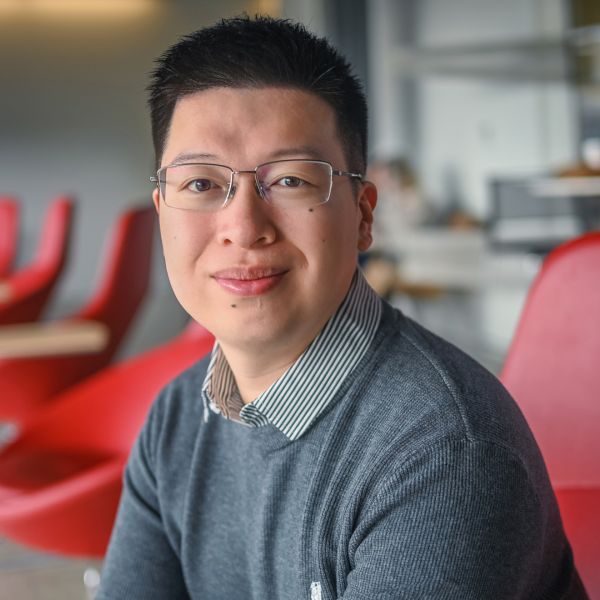Yian Yin Reflects on “Profoundly Influential” Time at Northwestern
Yin earned his PhD in 2022 and was recently named in Forbes’ 2024 ’30 Under 30’ in the science category
Yian Yin (PhD ’22) has accomplished plenty since earning his PhD in 2022 from the Department of Industrial Engineering and Management Sciences at Northwestern Engineering. He was listed in Forbes’ 2024 ’30 Under 30’ in the science category for his work developing tools to understand technological advancement, as well as earned the IEMS department’s Nemhauser Best Dissertation Prize.
Yin credits IEMS with both accomplishments.

“They reflect the collective efforts of my mentors and collaborators at Northwestern, without whom this achievement wouldn’t have been possible,” Yin said. “At the same time, we know (from our own research) that the golden age in a scientific career can occur at any time, so I hope my best work is always yet to come.”
Now an assistant professor of information science at Cornell University, Yin reflected on his time at Northwestern and how it shaped him as both a person and researcher.
How did your experience at Northwestern lay a foundation for your career? How did it help your development as a scholar and also a human being?
My experience at Northwestern has profoundly influenced the way I approach research in many ways. The academic environment in IEMS offered the perfect blend of methodological rigor and practical relevance, which fostered my intellectual curiosity in quantitative approaches to social systems. The curriculum and mentorship in the program helped me develop a strong analytical mindset, enabling me to abstract and solve real-world problems using advanced mathematical frameworks — something I consider one of my unique strengths as a computational social scientist. I also feel incredibly fortunate to have grown within such a collegial and supportive community, where faculty and fellow students are exceptionally kind and caring people. They served as great role models for me, which I now strive to emulate as a mentor and collaborator.
What do you remember most about your time at Northwestern?
What stands out most is the extremely collaborative community at IEMS and the Northwestern Institute on Complex Systems (NICO), from which I have benefited tremendously. I still remember that when I entered the program, all first-year PhD students shared the same office, creating an inspiring space for learning and collaboration. Many of us ended up developing very different research projects, but that was the time when we exchanged ideas and learned about each other's interests every day. Indeed, some of the key techniques I used in my dissertation wouldn't have been possible without discussions with my cohort, Yuchen Xie. We also spent countless hours hanging out together during that year, which was instrumental in getting through the stressful period of preparing for candidacy exams.
So far, what’s your proudest professional accomplishment?
I'm particularly proud of my project on quantifying the dynamics of failure, which was published in Nature's 150th anniversary issue. The idea was simple: human achievements are often preceded by repeated attempts that initially fail. But how exactly do we fail repeatedly and eventually succeed, or not? We spent three years analyzing data across very different domains — science, startups, and security – and ended up with a simple mechanistic model of failure dynamics that highlights a tipping point between success and failure. Indeed, this might be the first time that the concepts of failure and tipping points appeared together in the same paper, illustrating the power of combining fundamental ideas from physics and social sciences.
What are your goals moving forward?
I aim to leverage tools from data science and complexity sciences to enhance our ability to forecast and catalyze scientific discoveries, which are the fundamental drivers of economic growth and human prosperity. My research group is currently focused on exploring how emerging technologies, such as artificial intelligence, can unlock previously underexplored opportunities in scientific research. We are also investigating how to design innovative information and incentive systems to accelerate this transformative revolution.
What’s the best piece of advice you received at Northwestern? And what advice would you give a Northwestern IEMS student today?
"Be yourself and work on things that you believe are important."
It's easy to pursue what seems popular, but at the end of the day, true fulfillment and impactful work come from following your own passions and convictions. This advice encouraged me to believe in myself and keep working on research topics that I found truly meaningful.
For current Northwestern IEMS students, I would pass on the same advice: stay true to yourself and pursue what genuinely excites you. The academic journey is long and often challenging, but by working on issues that resonate with you personally, you'll find the motivation and perseverance needed to overcome obstacles, which I think is key to making a unique impact on the academic and broader community.
